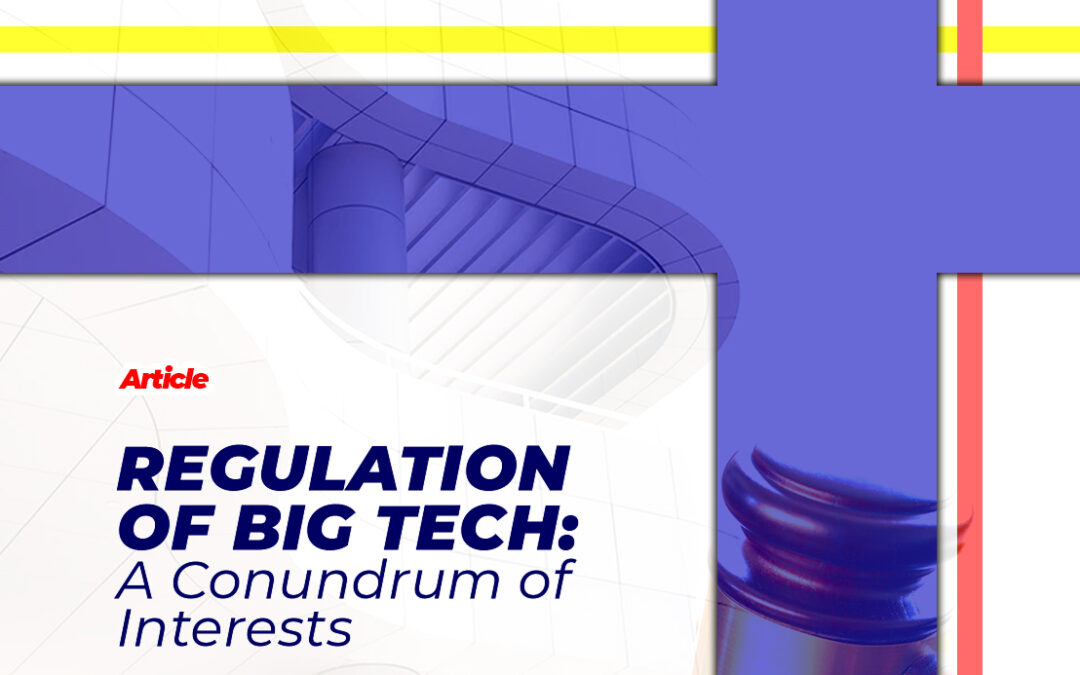
by Legalnaija | Apr 12, 2021 | Uncategorized
“Free speech no longer exists in America, it died with big tech”.Donald Trump Jr.
In a most unprecedented move, social media giants –Twitter, permanently suspended the account of former American President Donald J. Trump,following allegations that he had made inciting comments which led to violentprotests at the American Capitol building and its eventual occupation by protesters. Twitter’s action, has further fuelled ongoing conversations that social media platforms and indeed their CEOs, have become too powerful in their ability to shape public opinion in matters of politics, economy and other core facets of societal living.
This article is essentially a teaser. On the contrary, it seeks to establish that the arbitrary censorship of social media would reduce several democratic polities to pseudo dictatorships. In sharp contrast, it also beams a light on the several ills (for example increased hate speech, enhanced dictatorial tendencies of social media platform owners etcetera.) that befall society when social media is left unchecked. It concludes by opening a conversation on the plausible implementable solutions that can help achieve an equilibrium amongst the several actors in social media regulation.
Have Social Media Platform Owners Become Too Powerful?
On the 8th of January, 2021, the world awoke to receive the news that former American President, Donald Trump had been banned from Twitter for ‘inciting comments’ in the wake of the attacks at the American Capitol which left five persons dead. Commenting on the rationale for the ban, Twitter CEO Jack Dorsey via a Twitter post observed:
“I do not celebrate or feel pride in our having to ban @realDonaldTrump from Twitter, or how we got here. After a clear warning we’d take this action, we made a decision with the best information we had based on threats to physical safety both on and off Twitter. Was this correct?
I believe this was the right decision for Twitter. We faced an extraordinary and untenable circumstance, forcing us to focus all of our actions on public safety. Offline harm as a result of online speech is demonstrably real, and what drives our policy and enforcement above all.”
Indeed, the reactions trailing the ban of the Ex-President have been a mixed bag. German Chancellor, Angela Merkel regarded the move as ‘problematic’ as it, in her opinion, infringes on the right to free speech and expression. For the German Chancellor, such decisions to deny an individual a right to public expression is a subject matter that should be decided by laid down laws and designated government institutions.[1]Reprimanding the ban in a like manner, The United Kingdom’s Health Secretary Matt Hancock similarly observed: “The fact that a CEO can pull the plug on POTUS’s loudspeaker without any checks and balances is perplexing.”[2]
In whatever side of the divide one aligns, the uncontroverted fact remains that Social Media has transcended being a mere avenue of leisure and entertainment into a tool that can be utilized for the expression of free speech and other rights, as well as to galvanize public opinion on an array of public matters. It is the understanding of social media in this sense that has warranted the enactment of legislations by countries world over in seekingto strike a ‘balance’ on social media usage and abuse.
In its passage of theNetwork Enforcement Act, 2017, the German government became one of the first European countries to directly and specifically legislate on curbing the excesses of both social media ownership and abuse by users. By a combined reading of section 1(1), (2) and (3) of the Act[3], social media platforms with a minimum of two million users are mandated to establish channels that allow for the reporting of illegal content (which include contents on public incitement, sedition, terrorism etc.) which ought to be taken down by such platforms within 24 hours.
The law further requires such social media platforms to also publish bi-annual reports of their management of illegal content and the flagging of same[4] and stipulates a fine of up to $62,000,000 for companies that fail to comply.The German legislation in this regard has been criticized on two major grounds. First, critics opine that the 24-hour period giving to social media companies to review posts/contents that infringe on the Act is not sufficient to allow for a thorough process of review that guarantees meritorious regulation. Secondly, they also argue that the absence of an appeal process on most social media platforms after a user has been banned/suspended creates some sort of big-tech autocracy. Indeed, this further galvanises the position of world leaders like Angela Merkel who suggest that such procedures should be within the sphere of institutions of law.
How Much Regulation is Too Much?
In America, the acclaimed ‘home of democracy’ the approach to social media regulation has typically being, to allow social media platforms self-regulate by putting in place policies to track and remove offensive or illegal content. The free-hand allowed these companies essentially stems from the provisions of Section 230 of the Communications Decency Act 1996 which shields social media companies (like Twitter and Facebook) from liability for the content posted by their users.
In recent times however, there have been several outcries that tech giants were not doing enough to address the notoriety of illegal content on the internet. This pressure has ultimately pushed legislators in the US to reconsider the current arrangement of social media content regulation in the country. In 2020, the Eliminating Abusive and Rampant Neglect of Interactive Technologies Bill was introduced to the floor of the American Congress and it seeks to create exceptions to the provisions of the earlier mentioned Section 230 of the Communications Decency Act, 1996 by creating some sort of intermediary liability for tech giants[5]. This is in a bid to demand a higher sense of responsibility from social media giants in ensuring the serenity of their platforms.
Outside America however, the approach to social media regulation has been more stiff. Following terrorist attacks in Christchurch in 2017,the Australian Parliament enacted the Sharing of Abhorrent Violent Material Act, 2019 which amongst other things, warrants social media platforms to remove offensive, extremists and illegal content from their platforms ‘expeditiously’. A failure to comply attracts a fine of $2,100,000 or a 3-year imprisonment term when an individual is in default or a $10,500,000 fine/10%[6] of turnover when the defaulting entity is a corporate body.
The Australian legislation has come under heavy criticism for being rushed as it was made without due and wide consultations with the public. Critics have also stated that the requirement on social media platforms to ‘expeditiously’ remove offensive content as stated in the Act is too broad and undefined for a timeline, and makes the Act a ready tool for political witch-hunting in the hands of politicians.
Like the United States, the EU’s policy on social media content regulation has essentially being to mandate social media platforms to self-regulate. The Union has also responded by proposing a draft bill – the European Digital Act which seeks to mandate social media platforms to take down illegal content (on extremism, violence, child pornography etc.)within an hour. It further stipulates that whilst the failure to remove flagged content within an hour would not attract fines, the failure to remove same when flagged by a law enforcement agency would attract heavy fines. Indeed, this is obviously due to the fact that the later event would typically be on more authentic grounds.
The Nigerian Situation
In 2019, the Protection from Internet Falsehoods, Manipulations and Other Related Matters Bill, 2019 passed second reading on the floor of the Nigerian Senate. The Bill which is Nigeria’s first attempt at legislative regulation of social media content seeks to prevent the transmission of false statements/news and block access to finance for such online platforms. It also imposes a sanction of aN300,000 fine or a three-year imprisonment term on individuals in default of the law and a N10,000,000 fine on companies so found wanting. The Bill further empowers law enforcement agencies to mandate Internet Service Providers (ISPs) to block the internet access of persons alleged to have violated the provisions of the Act.
Perhaps, the most controversial element of the Bill is that it provides that the administration and enforcement of its provisions shall be vested in the Inspector General of Police. This has been heavily criticised by a vast majority of the Nigerian populace and opposition political parties who are of the opinion that the Bill seeks to deny the right to free speech and further empower the government and indeed politicians to victimize their political opponents and suppress critics. Consequently, at the Public Hearing held in respect of the Bill in March 2020, at the National Assembly, the Bill was largely rejected by civil society organisations and indeed members of the Nigerian public in attendance.
Nothing has since been heard of the Bill since the Public Hearing. The Senate has neither commenced a third reading of the Bill nor called for another Public Hearing. For some, it is testament that the will of the Nigerian people has prevailed over the wishes of a select few. Others, however still nurse the concerns that further attempts would be made in future to smuggle the Bill into the country’s legislations.[7]
The Way Forward
In today’s highly polarised modern society the issue of social media content regulation has become a hydra-headed conundrum. Governments and regional bodies across continents are posed with the question of how to curb the proliferation of the internet with illegal content without trampling on highly cherished citizen rights such as the freedom of expression and speech. It is firmly believed regardless, that any pragmatic approach to regulating social media must be one based on laws enacted after wide and broad based consultations with relevant stakeholders – the general public, social media users, the owners of social media platforms, security agencies and lawmakers.
This would ensure, that whatever laws are made would be a reflection of the true wishes of society and allow for little room for criticism on inclusiveness in the future. In a similar regard, it is also believed that the ultimate power to decide the termination of a person’s access to a social media should not be within the exclusive discretion of social media giants as this simply too much power!
It is suggested here that the value of a social media account (allowing an owner to achieve business advertising objectives and branding, political goals, activism etcetera) is of too much value to be treated trivially. Indeed, it should be equated with the status of a bank account ownership. Consequently, the denial of a person’s access to his account on the grounds of suspension/ban should be a subject contestable/appealable before the Courts of law.This truly would be allowing the law function as an agent of social engineering.

Authors: Mrs. OnyinyeChikwendu-Ikechebelu&Echoga Caleb
Mrs. Onyinye, is the Practice Manager of Omaplex Law Firm andmember of the project and asset finance group in Omaplex specializing in project and asset finance focusing on international aviation and shipping finance transactions.
While Echoga Calebholds a commendable legal expertise in intellectual property law, financial technology, and data protection and privacy law.
[1] Ryan Browne,‘Germany’s Merkel Hits out at Twitter over ‘Problematic’ Trump Ban’ <https://www.cnbc.com/2021/01/11/germanys-merkel-hits-out-at-twitter-over-problematic-trump-ban.html>Accessed, 25th March, 2021.
[2] Ibid.
[3] Network Enforcement Act, 2017.
[4] Section 2(1), Network Enforcement Act, 2017.
[5]David Morar and Bruna Martins, ‘ The Push for Content Moderation Around the World’<https://www.brookings.edu/blog/techtank/2020/09/21/the-push-for-content-moderation-legislation-around-the-world/>Accessed March 23, 2021.
[6] Section 474.34, Sharing of Abhorrent Violent Material Act, 2019.
[7]Mathew Ogune, ‘Protests Against Social Media Bill Persists in Abuja’The Guardian(Abuja, 10 March 2021) <https://guardian.ng/news/protest-against-social-media-bill-persists-in-abuja/> Accessed 10 March, 2021.

by Legalnaija | Apr 6, 2021 | Uncategorized

Lawbreed presents its special Easter Bumper sales tagged “season of great savings”. You get 10% on every 10K you Spend. You can also get up to 20% special discount consideration if you Call/Whatsapp: 08077011741/08077011730.It’s our season of love. Key into it Today while stock lasts!
This offer is available from now till 15th April, 2021
Call/Whatsapp/Text: 08077011730, 08077011741, 08077011755, 08023269613
Email: lawbreedorders@gmail.com /mails@lawbreed.com
www.lawbreed.com
* Terms and Conditions apply*

by Legalnaija | Mar 23, 2021 | Uncategorized
Innovating Justice Challenge 2021
Calling all game-changing justice startups that want to grow their impact and business.
Is your startup or social enterprise looking to solve a pressing justice problem in the West Africa region, and to do it in a way that is high impact and sustainable? The HiiL Innovation Hub West Africa is delighted to announce that applications for the annual HiiL Innovating Justice Challenge are now open. Successful applicants will earn a place in the prestigious international HiiL Justice Accelerator programme, along with EUR 10 000 in funding and a package of tailored local support.
Through the HiiL Innovating Justice Challenge, we are looking for the most promising social entrepreneurs from West Africa that aspire for everybody to have access to justice at work, at home, in the neighbourhood and in business. Startups that empower people with breakthrough innovations to create better – working conditions with their employer – protection against theft, fraud and violence – arrangements about noise, damages and property access with their neighbour – housing maintenance and rent conditions with their landlord – agreements on ownership, registration and use of land – separation terms with their spouse – contracts, fraud protection and compliance for their small business.

We are especially interested in startups that work on what we’ve identified as potential gamechangers. We seek startups that have a proven solution with increasing annual revenue and impact, have a scalable business model, are on their way to financial sustainability and are led by a strong team with experienced founders. Startups can be for-profit or non-profit! The HiiL Innovating Justice Challenge 2021 The Innovating Justice Challenge scouts and selects the most promising justice innovations for the Justice Accelerator programme. Between 15 March and 30 April 2021, justice entrepreneurs can apply for the Challenge via www.hiil.org/innovating-justice-challenge. The HiiL Justice Accelerator HiiL’s Justice Accelerator offers startups a four-month programme that provides €10,000 non-equity seed funding, business development support (which includes training, coaching and mentorship), access to a global network, international exposure, and connections for further investment opportunities. At the annual Innovating Justice Forum, startups pitch to an international jury and compete for additional cash prizes:
- €20,000 (1st place),
- €10,000 (2nd place), and
- €5,000 (3rd place).
HiiL’s Justice Accelerator is the only accelerator that focuses on preventing and resolving justice problems. We look for startups that can grow and scale to impact thousands and potentially millions of people. HiiL has supported more than 120 justice innovations worldwide since 2011. Some of those have become big, impacting the lives of hundreds of thousands of people and scaling to a regional level with the potential to become global players. About HiiL HiiL (The Hague Institute for Innovation of Law) is a social enterprise devoted to user- friendly justice. That means justice that is easy to access, easy to understand, affordable, and effective.

We will ensure that by 2030, 150 million people will be able to prevent or resolve their most pressing justice problems. We do this by stimulating innovation and scaling what works best. We are friendly rebels focused on concrete improvements in the lives of people. Data and evidence are central in all that we do. We are based in The Hague, the City of Peace and Justice. To submit an application, please visit www.hiil.org/innovating-justice-challenge.
The Call for Applications closes at 23:59 CET on 30 April 2021.
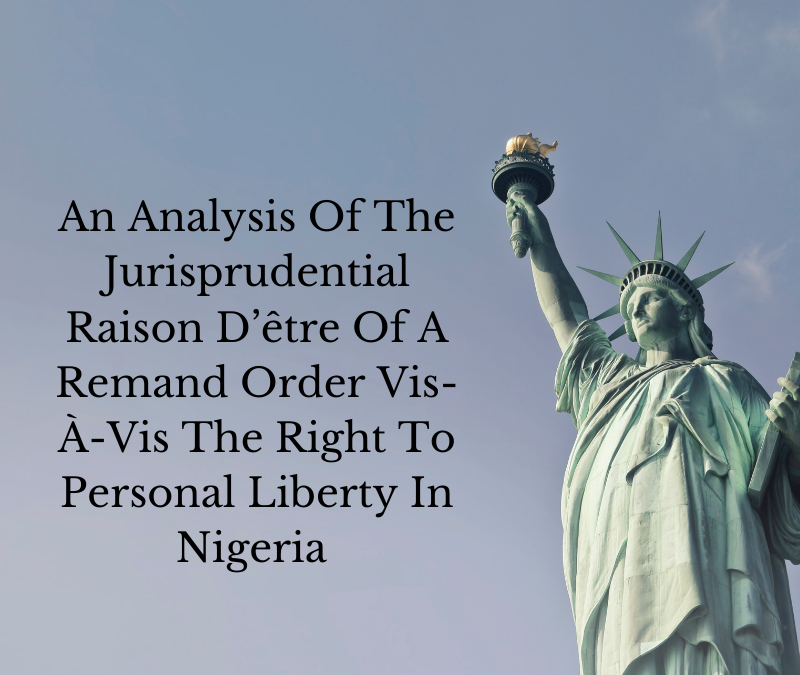
by Legalnaija | Mar 23, 2021 | Uncategorized
An Analysis Of The Jurisprudential Raison D’être Of A Remand Order Vis-À-Vis The Right To Personal Liberty In Nigeria[1]
A suspect arrested for an offence which a magistrate court has no jurisdiction to try shall, within a reasonable time of arrest, be brought before a magistrate court for remand.[2]
INTRODUCTION
The above periscope from the Administration of Criminal Justice Act 2015 (hereinafter to be referred to as ‘ACJA’) has precipitated a bevy of controversies. The sections (SS. 293-299) have been tagged a smokescreen as they presumptuously create a holding charge which has been declared by the highest Courts of the land an anathema to our laws. More so, the sections seem to be an affront to the venerable and hallowed fundamental human rights enshrined in the Constitution of the Federal Republic of Nigeria (hereinafter to be referred to as ‘the Constitution’), to wit: the right to personal liberty, as they ostensibly promote pre-charge detention. Premised on the foregoing, this article seeks to address these less certain penumbras of the provisions of the ACJA, distinguish between a ‘holding charge’ and a ‘remand order’, take a cursory look at the legality of pre-charge detention in some countries, viz. the United Kingdom, the United States of America, and Australia, and examine the legality vel non of a remand order vis-à-vis the right to personal liberty as enshrined in the Constitution.
A CONSPECTUS ON THE ADMINISTRATION OF CRIMINAL JUSTICE ACT, 2015
Before delving into the crux of this article, it is important to note in incisive terms that, the Administration of Criminal Justice Act was enacted to ensure the system of administration of criminal justice in Nigeria promotes efficient management of criminal justice institutions, speedy dispensation of justice, protection of the society from crime and protection of the rights and interests of the suspect, the defendant, and the victim[3] (Emphasis Mine).
It therefore follows that, the Act, which is a law by the National Assembly, seeks to maintain law and order in the society as envisaged in the provision of section 4(2) of the Constitution. Its main purpose is to ensure that there’s an effective system in place for the administration of criminal justice.
DISTINGUISHING BETWEEN A ‘HOLDING CHARGE’ AND A ‘REMAND ORDER’
A holding charge and a remand order are prima facie akin, but they are not coterminous as there exists a fine line between both.
The term ‘holding charge’ is defined by the Black’s Law Dictionary 8th Edition, as “a criminal charge of some minor offences filed to keep the accused in custody while the prosecutor takes time to build a bigger case and prepare a more serious offence.”
From the foregoing, it is limpid that a holding charge is usually filed malafide in other to keep the accused/suspect in custody for a minor offence whilst the police conduct a solid investigation to support a main charge.
The Lawyers’ League for Human Rights, in its publication titled ‘Criminal Justice System in Nigeria: The Imperative of Plea Bargaining,’ also holds the view that holding charge has no statutory foundation in Nigeria’s penal legislation, and explains the concept as a “term used by the legal community in Nigeria to describe a criminal charge that is filed against an accused person by the police before a magistrate court that ostensibly has no statutory power to try the offence charged, but makes an order remanding the person charged in prison custody pending conclusion of investigation or the arraignment of the person in the high court, upon information being filed by the Attorney General.”
A holding charge has been declared by the Courts of the land to be completely illegal, unconstitutional, otiose and of no effect whatsoever in a retinue of cases. See OGOR v KOLAWOLE (1985) 6 NCLR 534 at 539; EYU v THE STATE (1988) 2 NWLR (Pt. 78) 602 at 608; ENWERE v C.O.P (1993) 4 NWLR (Pt.229) 333; ANAEKWE v C.O.P (1996) 3 NWLR 9Pt. 436) 320 at 332; JOHNSON v LUFADEJU (2002) 8 NWLR (Pt. 768) 192 at 217; AGUNDI v C.O.P (2013) ALL FWLR (Pt 660) 1243; SHAGARI v C.O.P (2005) 3 Q.C.C.R, (P. 17 at 36), per Sanusi, JCA
However, a remand order is quite different. It is made to detain a person who has been charged with a crime until trial; such person may be remanded until conviction or acquittal – this is applicable in capital offences. The provisions backing up a remand order are provided for in the Administration of Criminal Justice Act which deals, totally, with the system of administration of criminal justice in Nigeria.
The Supreme Court of Nigeria in Lufadeju v Johnson (2007) 8 NWLR (Pt 1037) P. 562 paras. F-G, defined remand to mean: ‘…To send to prison or send back to prison from a court of law to be tried later after further inquires have been made; often is the phrase “remanded in custody”. It also means to re-commit, on trial, the accused to custody after a preliminary examination.’
A remand order, provided for in the Administration of Criminal Justice Act, seems to be in line with the provision of section 35 (1) of the Constitution, and is designed to aid administration of criminal justice in the country. However, more on that later.
THE LEGALITY OF PRE-CHARGE DETENTION IN SOME COUNTRIES
THE UNITED KINGDOM
By the provision of section 41(1) of the Police and Criminal Evidence Act of 1984 (PACE), the police is empowered to detain an individual for up to a maximum 24 hours, after which a decision has to be made to either charge to court or release such an individual. However, under section 42(1) of PACE, the 24 hour detention may be extended to a maximum of 36 hours if the police have ‘reasonable grounds’ to believe that the continuous detention of such person is necessary to secure or preserve evidence; that the offence in question is an indictable one and the investigation is being conducted diligently and expeditiously. Any further detention, up to a maximum of 72 hours may only be authorised by a Magistrate, after an application to the Court by the police.
However, schedule 8 of the Terrorism Act 2000 governs the pre-charge detention of those arrested on suspicion of being a terrorist.[4] Legal limitations on the period of time a terrorist suspect can be detained prior to charge run from the time of arrest.[5] After 48 hours, a judicial warrant is required to keep a suspect in detention without charge.[6] A judge can only issue a warrant if satisfied that there are reasonable grounds to believe that (a) it is necessary, inter alia, to obtain or preserve relevant evidence and (b) that the investigation is being conducted diligently and expeditiously.[7] The first judicial warrant would normally authorise detention for up to a maximum of seven days.[8] Further judicial warrants may then be issued, each extending the period by up to seven days. Warrants authorising detention beyond 14 days can only be made by a senior judge. A judicial warrant may not authorise detention for more than 28 days from the time of arrest, meaning that at this point a suspect must be either charged or released.[9] This puts the maximum period of pre-charge detention in terrorism cases at 28 days, and four days for criminal offences unrelated to terrorism.[10]
THE UNITED STATES OF AMERICA
In County of Riverside v. McLaughlin[11], the Court determined that detention, without a specific charge on the basis of probable cause, was constitutionally permissible for less than 48 hours.[12] Thus, a judicial charge on the basis of probable cause within 48 hours of arrest would not constitute an “unreasonable” seizure period under the Fourth Amendment to the Constitution.[13] The U.S. Supreme Court has held that the Fourth Amendment to the Constitution imposes certain limits on the detention of persons prior to a formal charge.[14]
Under U.S. Federal law the maximum period of pre-charge detention for criminal suspects, including those suspected of committing terrorist offences, is 48 hours.
AUSTRALIA
In Australia, a person arrested for a terrorism offence cannot be detained for more than four hours from the time of arrest for the purpose of investigating whether the person committed that offence, or another terrorism offence the investigating official reasonably suspects the person to have committed.[15] The detainee must be released within the period or brought before a judicial officer.
In terrorism cases, the pre-charge detention period can be extended a number of times to a total of 24 hours on application by the investigating official to a judicial officer, normally a magistrate.[16] The limit is 12 hours for other serious offences.[17]
The laws of Australia also provide for dead time. ‘Dead time’ is not included in the periods referred to above. Accordingly, dead time can allow a person to be detained longer than 24 hours but the total amount of time spent questioning the person cannot be longer than 24 hours.[18] There is no statutory cap on the maximum amount of ‘dead time’ that can be authorised. Such ‘dead time’ includes for medical attention, because the detainee is intoxicated or to allow reasonable time for detainee to rest or recuperate; for applying for extensions of questioning time; for an ID parade, etc.
The first and only case in which an extended period of dead time was authorised by a magistrate it led to a person being detained for a total of 12 days without charge.[19] This is considered to be the maximum period of pre-charge detention that would, in practice, be allowed in Australia.
In addition, the Australian Federal Police may obtain a ‘preventative detention order’ to substantially assist in preventing an imminent terrorist attack or to preserve related evidence after a terrorist attack. This allows preventative detention for an initial period of 24 hours, extendable by a further 24 hours.
THE LEGALITY VEL NON OF A REMAND ORDER VIS-À-VIS THE RIGHT TO PERSONAL LIBERTY
The legal enclave has been inundated with arguments reconciling the provisions of the Administration of Criminal Justice Act with that of the Constitution. Arguments have also been advanced that the provisions of ACJA clearly countermand the provisions of the Constitution, and should, therefore, be declared null and void to the extent of its inconsistency. I intend to carry out a detailed analysis of both provisions.
The provision of section 35(1) of the Constitution is diaphanous and beyond peradventure. For ease of reference, I should allow myself reproduce the section hereunder:
‘Every person shall be entitled to his personal liberty and no person shall be deprived of such liberty save in some case and in accordance with a procedure permitted by law, as outlined in 1(a) to (f)’
From the above periscope, it is clear that every person is entitled to personal liberty. Such liberty is sacrosanct and can only be encroached upon in some cases which are in accordance with a procedure permitted by law. As we shall soon come to see, remanding a person has its procedure which is permitted by sections 293-299 of the ACJA. See OHIZE v C.O.P (2014) LPELR — 23012, per Akomolafe-Wilson, JCA; LUFADEJU v JOHNSON (SUPRA), per Muktar, JSC (as she then was).
However, section 35(1) (c) provides that for the purpose of bringing a person before a court, in execution of the order of a court or upon reasonable suspicion of that person having committed a criminal offence, or to such extent as may be reasonably necessary to prevent his committing a criminal offence, his personal liberty may be deprived. Furthermore, section 35(4) provides that any person who is arrested or detained in accordance with subsection (1) (c) of this section shall be brought before a court of law within a reasonable time, and if he is not tried within a period of –
- two months from the date of his arrest or detention in the case of a person who is in custody or is not entitled to bail; or
- three months from the date of his arrest or detention in the case of a person who has been released on bail, he shall (without prejudice to any further proceedings that may be brought against him) be released either unconditionally or upon such conditions as are reasonably necessary to ensure that he appears for trial at a later date.
‘A reasonable time’ is defined in S.35(5) to mean:
- in the case of an arrest or detention in any place where there is a court of competent jurisdiction within a radius of forty kilometers, a period of one day; and
- in any other case, a period of two days or such longer period as in the circumstances may be considered by the court to be reasonable. (Emphasis Mine)
From the foregoing, precisely section 35(1) (c), a person’s right to personal liberty can be deprived wherein he is suspected to have committed a criminal offence or to prevent his committing a criminal offence. However, when arrested or detained by the police, it is expected that he be brought before a court of law within a ‘reasonable time.’ The reason for bringing him before a court of law is a bit ambiguous as it could be for arraignment, which is the substratum of a trial, or for obtaining a legal basis to deprive him of his right to personal liberty. If the case is the latter, then it necessary that whilst further investigation is being conducted, due process of law for depriving a person of his right to personal liberty should be followed. Usually though not invariably, investigation surpasses the ‘reasonable time’ which is two days, and for this reason the Constitution provides that such person, whilst investigation is ongoing must not be kept in custody for more than two months in the case of a person who is not entitled to bail – this is most likely applicable in capital offences, and in the event where he has been released on bail, a period of three months from the date of his arrest or detention.
Dovetailing these with the provision of the ACJA, to wit: section 293 which states thus:
‘A suspect arrested for an offence which a magistrate court has no jurisdiction to try shall, within a reasonable time of arrest, be brought before a magistrate court for remand.’
From the provision of section 293 of the ACJA, a suspect arrested shall within a reasonable time of arrest be brought before a court of law (namely a magistrate court) for remand. We would recall that the provisions of the Constitution provide that an arrested or detained person be brought before a court of law within a reasonable time, either for trial or remand, as section 35 (4) provides, ‘…and if he is not tried…,’ this clearly shows that a person/suspect may be brought before a court of law not to be tried but to obtain a remand order. The ACJA being a specific statute goes further to provide and dilate on one of the ways due process of the law should be followed, that is, an application for a remand be made ex parte, certain things may be taken into consideration when considering if ‘probable cause’ to remand has been shown, the remand shall be for 14 days and may be extended for another 14 days if ‘good cause’ is shown. Where at the expiration of the 28 days, the suspect is still in custody, the law provides that a hearing notice be issued by the Court to any relevant authority in whose custody the suspect is, and the matter can only be adjourned within a stint of 14 days and not exceeding such. Sections 296 (1), (2), (4). Section 296 (5) provides that pursuant to the hearing notice, such relevant authority may show good cause as to why the remand order should be extended for a further 14 days, finally, if need be.
It must be noted, however, that after the expiration of the stint of 28 days, the court may, on application of the suspect, grant bail. Section 296 (3).
It is submitted that the Administration of Criminal Justice Act has made a remand order legal as it can now be subsumed under a due process permitted by law.
More so, the Constitution provides for the extent of a detention to be: a maximum period of 2 or 3 months as the case may be, colligating this with the provisions of section 296 of the ACJA, having in mind the sum total/maximum number of days allowed for a remand, to wit: 42 days, that is, a period of 14 days at first, another 14 days if ‘good cause’ is shown, and a further 14 days upon the request of the Inspector-General of Police or the Commissioner of Police and the Attorney-General of the Federation, consequent upon the issuance of a hearing notice by the Court (the period allowed for adjourning the matter when a hearing notice is made is hereby excluded), shows that the provisions of the ACJA are ad idem/interlock with that of the Supreme law of the land.
PERORATION
A remand order, sadly, has become indispensable as it is needed to ensure that the detention of criminal suspects, which are not immediately tried because proper investigation is still ongoing, is done according to due process of law.
The tardy grinding of the wheels of justice seems to be the quagmire beleaguering the system as suspects spend time awaiting trial. This can only be dealt with by, putting in place, mechanisms needed for ensuring speedy trials.[20]
It is also important to note that it is banal principle that the Courts have no jurisdiction to question the law making power of the National Assembly and the House of Assembly of States (the Legislature). This is because the power to make laws is vested in them by dint of section 4 of the Constitution, and the Courts cannot by or through the common law divest them of such.[21] However, where a statute or any provision(s) of a statute enacted is in breach of the Constitution, the Courts must step in to declare such statute or provision(s) of such statute otiose.
REFERENCES

Damilola Obanijesu Oyawole
[1] Damilola Obanijesu Oyawole, an undergraduate law student of the University of Ilorin. He has a panache for Legal Research, Litigation, Intellectual Property, Cyber Security, Property Law, and Arbitration. He can be reached via obanijesudamil@gmail.com
[2] Section 293(1) of the Administration of Criminal Justice Act 2015.
[3] ACJA, S.1(1).
[4] As amended by the Terrorism Act 2006.
[5] Terrorism Act, S.41(3) and Schedule 8, para 36(3B). The police have the power to arrest anyone they suspect of being a terrorist without a judicial warrant (TA, S.41).
[6] TA, S.41(3).
[7] TA, Schedule 8, para 32.
[8] TA, Schedule 8, para 29(3).
[9] TA, Schedule 8, para 36(3)(b)(ii).
[10] Section 44 of the Police and Criminal Evidence Act 1984.
[11] 500 U.S. 44 (1991).
[12] Ibid at 56.
[13] Ibid.
[14] See Gerstein v. Pugh, 420 U.S. 103, 125 (holding that States “must provide a fair and reliable determination of probable cause as a condition for any significant pre-trial restraint of liberty…by a judicial officer either before or promptly after arrest.”).
[15] S.23CA Crimes Act 1914.
[16] S.23DA Crimes Act 1914.
[17] S.23D Crimes Act 1914.
[18] S.23CA Crimes Act 1914.
[19] Dr Haneef was arrested on 2 July 2007 in connection with the failed bomb attacks in the UK. He was charged 12 days later with supporting a terrorist organisation but the Director of Public Prosecutions withdrew the charges on 27 July 2007 because there was insufficient evidence to establish the elements of the offence.
[20] Oti, I. C., 2016, 80 Percent of the Inmates in Nigeria Prisons have not even been tried in Court; Ayade, E. A., 2010, Problems of Prisons Overcrowding in Nigeria: Some lessons from South Africa and America. LLM, Human Rights, Unpublished Thesis, Central European University, Legal Studies Department, Budapest, Hungary.
[21] Ngozi Efobi and Naomi Ekop, Legal Systems in Nigeria: Overview, available at:https://uk.practicallaw.thomsonreuters.com/w-018-0292?transitionType=Default&contextData=(sc.Default)&firstPage=true
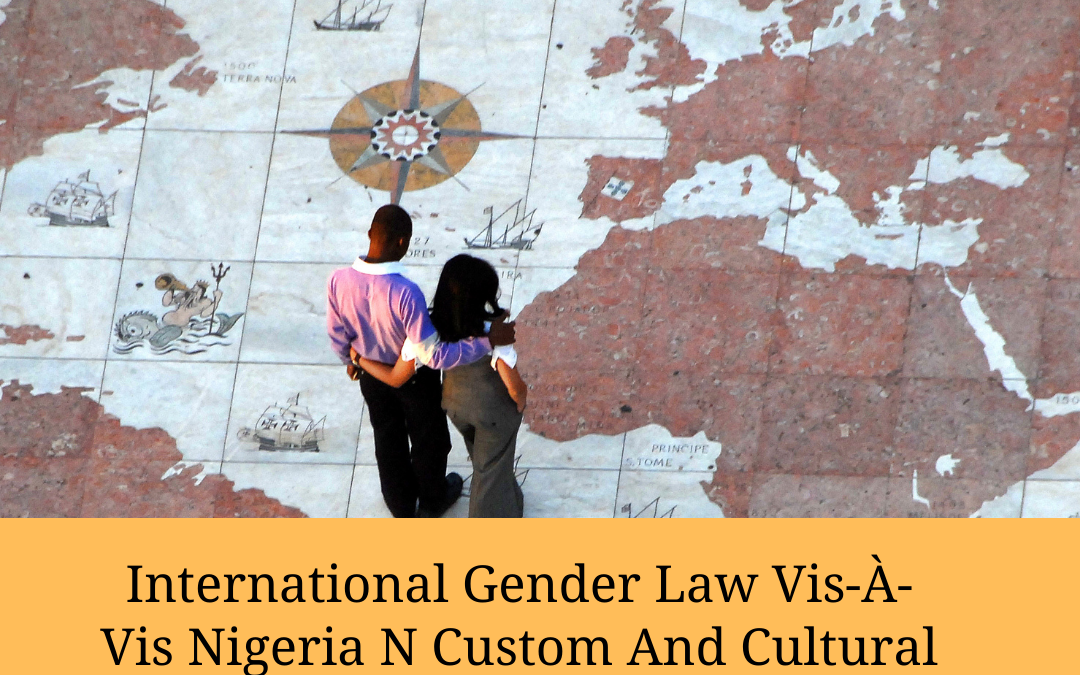
by Legalnaija | Mar 23, 2021 | Uncategorized
International Gender Law vis-à-vis Nigerian Custom and Cultural Practices[1]
Introduction
The rate at which the female counterparts in Nigeria are being deprived of their rights to the inheritance of parent’s and acquisition of personal property is alarming just based on customary laws and religious practices compared to what is operative in the general world Both men and women are entitled to the equal footing to the full protection of their right and freedom because they are a human being. In Bayelsa State South-South Nigeria, it is heard that whenever a woman believed to be possessed dies in any part of the State, her remains will be thrown into the water or the remains of every dead woman in the State will face a water test. If the remains sink after being thrown into the river then she is truly possessed and will be left to feed the fishes but if the remains float, then she will be brought back home and given a befitting burial. How many of the male counterpart in the State goes through inhuman treatment? It is proven that once life leaves the human body it becomes heavy, how then will a lifeless body float on a river? The question is why has the female counterparts been viewed as less inferior compared to the male counterpart? Society is filled with some riffraff just because the family members drove them and their mother as the case may be from home and took over the properties the husband or the parents left behind.
Globally, women or the female child have experienced various forms of abuses and discrimination[2]. These Customary Laws which most people of the country subject themselves to make it impossible for wives to inherit the property(s) of her late husband, she is on the other hand viewed as an asset which should be inherited and not to inherit any property. Also, a female child has no right to inheritance from the property(s) of her late parents, that her portion of inheritance is in her husband’s house whereas the husband or members of his household believes she is an asset to be inherited. What then is the fate of the female counterpart in a world dominated by the male counterpart?
This gender discrimination had been existing even from the time of the holy books, still existing and if proper attention and caution are not taken, it will continue to exist in our society irrespective of the level of education or exposure. This thesis seeks to examine the provision of the international gender law vis-à-vis the Nigerian customary laws and provide a possible way(s) for people who find themselves in menace. The world in its entirety has gone beyond the primitive times and therefore both male and female should be given equal consideration to acquire and inherit property(s) in the country and not just be contained in black on white without any regard[3].
Universal Declaration of Human Rights[4]
Recognition of the inherent dignity and the equal and inalienable rights of all members of the human family is the foundation of freedom, justice, and peace in the world[5].
The Article makes provision to recognize both sexes as being equal in dignity and rights and being born free without any prejudice[6]. We are both equals regardless of age, color, or education as what party A enjoys as a citizen of a State, party B has equal rights to enjoy the same and should not be cheated, coerced, or manipulates into thinking that we are not equal.
Article 6[7] states that;
everyone has the right to recognition everywhere as a person before the law.
It is crystal clear that every human on the face of the earth is to be considered a person having that same right in every part of the world and not a thing that can be taken, won, or tossed around whenever the dictator fancies. These rights should in no way be discriminated and such happens, the affected person has the right to seek redress[8].
Going forward, Article 17 of the same Law provides that;
(1) Everyone has the right to own property alone as well as in association with others.
(2) No one shall be arbitrarily deprived of his property.
From the above provision, it is obvious that everyone has the right to acquire property(s) and by inference inherent properties without any discrimination whatsoever.
Convention on the Elimination of All Forms of Discrimination Against Women[9]
The Convention being aware of the existence of discrimination against the female counterpart gave the need for the establishment and their discrimination covers but not limited to distinction exclusion and seclusion of the sex to other sex[10].
Article 2 (f) provides that;
to take all appropriate measures, including legislation, to modify or abolish existing laws, regulations, customs, and practices which constitute discrimination against women.
Having this in mind, States that subscribe to the Convention are expected to remove from their existing Laws provisions that are detrimental to women enjoying the same rights which the men counterparts enjoy. However, we have some States who are a subscriber to the Convention with the same laws existing within their purview.
Article 5 (a) provides that;
to modify the social and cultural patterns of conduct of men and women, to achieve the elimination of prejudices and customary and all other practices which are based on the idea of the inferiority or the superiority of either of the sexes or stereotyped roles for men and women
PROTOCOL TO THE AFRICAN CHARTER ON HUMAN AND PEOPLES’ RIGHTS ON THE RIGHTS OF WOMEN IN AFRICA[11]
The Protocol referred to Article 18 of the African Charter on Human and People’s Rights which provides that each State adopting it should remove from its Law any form of discrimination against women as it is declared internationally. But in the actual sense of it, there are States in Africa that have adopted the Charter and the Universal Declaration of Human Rights and still have vivid discrimination against women encoded in their laws and customary laws.
Article 2 of the African Charter provides that;
states Parties shall combat all forms of discrimination against women through appropriate legislative, institutional, and other measures.
By implication, it is mandatory for every African States who had adopted the Charter to remove every discrimination from its laws and shall defend the rights of citizenship regardless of sex but this seems to be a mere fallacy considering what is operative in the African continent and in particular Nigeria which is the center of the discussion.
Moving ahead, Article 6 (j)[12] makes provision for every woman in the course of the marriage to acquire and administer property(s) of her own without any discrimination whatsoever on her person and this property should in no way be deprived of her. Also, Article 6 (d), provides that in the course of a divorce, the couples shall have an equal right to joint property(s).
The list goes on and on different laws and conventions providing for recognizing equality between the sex. However, we see a different thing being in vogue in our continent Africa and the whole generally but because this discussion is centered on Africa and in particular Nigeria customary laws, we shall vividly discuss some of the notable customs in Nigeria.
Examination of the Customary Laws in Nigeria.
Nigeria is a country with over two hundred (200) ethnic groups and 500 languages. Each ethnic group with its own culture, custom, and tradition[13]. The different customary laws in Nigeria have their dictates which have elements of the deprivation of inheritance of property[14]. Some religious practices in the country even make provision that a married woman has no right to purchase anything and even if any purchase is made by her, the purchase belongs to her husband. However, considering the multiplicity of ethnic groups in the country, it is reasonable that the major ethnic groups, Igbo, Yoruba, Hausa, and Edo/Benin Customary Laws are examined.
- Igbo Customary Law of inheritance
In describing the Ibo customary Law of succession we may have to start from Onitsha because of its historical and ethnic link with the Benin customary law with which Onitsha share the rule of primogeniture[15] with some variations in places like Anambra, Imo, Rivers, etc. The eldest son or the Okpalais entitled to inherit his father’s dwelling house exclusively[16]. In Ugbona v. Ibenema[17], Egbuna J held inter alia that Ibo woman being a daughter or wife has no inheritance right to property of her parents or husband[18].
From the foregoing, the only means through a female child can inherit in her father’s household under the Igbo Customary law is possible especially in Idemili Local Government of Anambra State is when she has performed nrachi[19] ceremony. In a situation where the woman acquires landed property of her own, unless she has a son, her uterine brothers, or where she does not have uterine brothers, her stepbrother is entitled to inherit her self-acquired property and not her daughters who are entitled to inherit her personal effects.
- Yoruba Customary Law of inheritance
Succession or inheritance of property among the Yoruba tribe of Nigeria is subject to Ori-jori i.e. per capita or the children of the deceased based upon the number of wives the deceased had. Each wife and her children constitute Idi-igi or stock. It should be noted that it is immaterial that any of the wives had predeceased the husband, as long as she has a child or children before her death, her side remains stock in the family[20]. It should however be noted that in the Yoruba tribe, the eldest surviving son inherits the property(s) of the father. In Salami v. Salami[21] it was held that the plaintiff’s right to inherit her father’s estate along with her two brothers was not diminished by the fact that she was a girl. It is also relevant in this connection to note S. 20(4) of the Western Nigeria Customary Law, which provides thus:
Where the customary law applying to land prohibits, restricts, or regulates the devolution on death to any particular class of persons of the right to occupy such land, it shall not operate to deprive any person of any beneficial interest in such land (other than the right to occupy the same or proceeds of the sale, therefore, to which he may be entitled under the rules of succession or any other customary law.
- Hausa Customary Law of inheritance
Inheritance of property amongst the Hausa is subject to the dictates of the Islamic Law which state that one-third of the property must be given out on charity and the rest shared among the family members including the wife(s). Hausa native law and custom, before the advent of Islam, young males and females are not entitled to inherit from their deceased father’s estate as was held in Mohammad v. Mohammed[22]. The rationale behind this was that since young sons and daughters could not go to war and secure booties or loot (Gamina), they should not be allowed to inherit as heirs. However, under the Sharia system, the notion of Qawama[23] is interpreted to mean that men as a group are the guardians of and are superior to the women as a group. That notwithstanding, Sharia affords women whether daughters or wives the right of succession, making it the only customary law that guarantees such rights. The provisions have put the Sharia customary law on a higher pedestal in the realm of succession rights with emphasis on equality of all human beings.
- Edo/Benin Law of inheritance
The principal house or Igi ogbe is of utmost importance in Benin customary law[24]. This is as a result of that the principal house is always inherited by the eldest surviving son of a deceased person absolutely notwithstanding any instruction, disposition in a Will, or family arrangement to the contrary[25]. Ogiamien v. Ogiamien[26] has provided two (2) supporting grounds for the aforementioned position; firstly the eldest son of a deceased hereditary title holder succeeds to all the property of his father to the exclusion of other children. Secondly, the eldest son inherits only the principal house. Taking over the properties is only possible after the successful completion of the father’s burial rites. However, in a situation where the eldest surviving son is incapacitated to perform the burial rites of the deceased father, the duty is passed to the next surviving son regardless of the fact whether or not there are female children of the deceased who could handle the funeral rites of the father.
Haven considered the different major Customary Laws in Nigeria and their dictates about the acquirement and inheritance of property(s) which we could see to be discriminatory to the female counterparts viewing them as a ‘thing’ rather than the ‘human’ attribute who can acquire and inherit property(s) at any time she so desires. It is however required to examine some of the International provisions which make provision for both sexes to be of equal standard.
Ways out
It should however be noted that the possible way out of the menace women in Nigeria still suffer from all in the name of Customary Laws which will be discussed here are exhaustive enough and additional remedy or way out could be added personally.
- Punishment and Penalties
As the proverbial statement said that law without punishment will not be obeyed. In the actual sense, we have the abolition of discrimination against women’s rights encoded in our laws in Africa but none of these laws has a punishment to be meted out to anyone found defaulting. It is believed that if there is a serious punishment attached to these laws, people will find it grievous to defile them[27].
- Remedies
From the foregoing, if the laws could have punishment and penalties encoded within them, it is appropriate to say that the laws also should have adequate and relevant remedies in place for women who might have suffered or are suffering from these discriminations. However, for this to be in place effectively, some steps must be considered;
- They must be timely.
- They must be physically accessible.
- They must involve a clear and well-defined procedure, in terms provided for by the law, for establishing liability.
- They must enable recourse to functional independent and impartial bodies, with the authority to make enforceable decisions, impose sanctions, and award remedies[28].
By
Adeleye Adebola Valentine
+2348108173996
[1] Adeleye Adebola Valentine LL.B LL.M (In view) Ministry of Justice, Bayelsa State, 08108173996, av_debola.1@yahoo.com
[2] AJABOR, Ifeanyi Esq & OVREME, Olika Aforkoghene Esq. International Journal of Innovative Legal & Political Studies The Female Right Of Succession Under The Igbo Customary Law: A Critique 7(1):59-67, January-March 2019
[3] Section 42 (1) of the 1999 Constitution and also again section 42 (2) of the 1999 Constitution.
[4] UN General Assembly Universal Declaration of Human Rights, 10 December 1948, 217, A (III), available at: http://www.refworld.org/docid/3ae6b3712c.html [accessed 10 March, 2021].
[5] Preamble
[6] Article 1 and 2
[7] Supra
[8] Article 8
[9] UN General Assembly Convention on the Elimination of all Forms of Discrimination Against Women, 18 December 1979, United Nations, Treaty Series, Vol 1249, P 13, available at: http://www.refworld.org/docid/3ae6b3970.html [accessed 10 March, 2021].
[10] Article 1
[11] Also known as Maputo Protocol. It is an international human rights instrument established by the African Union that went into effect in 2005.
[12] Supra
[13] Wikipedia List of Ethnic groups in Nigeria https://en.m.wikipedia.org/wiki/List_of_ethnic_groups_in_Nigeria Accessed 1 March, 2021 10:05.
[14] Supra.
[15] Nwugege v. Adigwe & Anor (1934) 11 NLR 134
[16] Nwafia v. Ububa (1966) 1 ALL NLR 8
[17] (1967) NMLR 251
[18] Nzeianya v. Okagbue & Ors (1963) 1 All NLR 352
[19] Denying herself not to marry where all her fathers’ children are female so that she may produce male children to maintain the continuity of the family.
[20] A.B. Kasumu and J.W. Salacuse Family Law (Revised ed. Butterworth London) pg. 39.
[21] (1924)5 NLR 43.
[22] (2002) NWLR (pt. 708) p. 104
[23] Modupe D-Fagbongbe, Gender Discrimination Challenges for the twenty-first century [2002] (4)
[24] A. Osaretin, The Principal house in Benin Customary Law.
[25] Ugbo v. Asemota, unreported, Suit No B/49/70 of 30th March 1974, High Court Benin
[26] [1967] NMLR 245
[27] Article 2(b) CEDAW; CEDAW General Recommendation 28, Paras. 17 & 37(b); CEDAW General
Recommendation 25, Para.7.
[28] International Human Rights Law and Gender Equality and Non-Discrimination Legislation Requirements and Good Practices – a Briefing paper
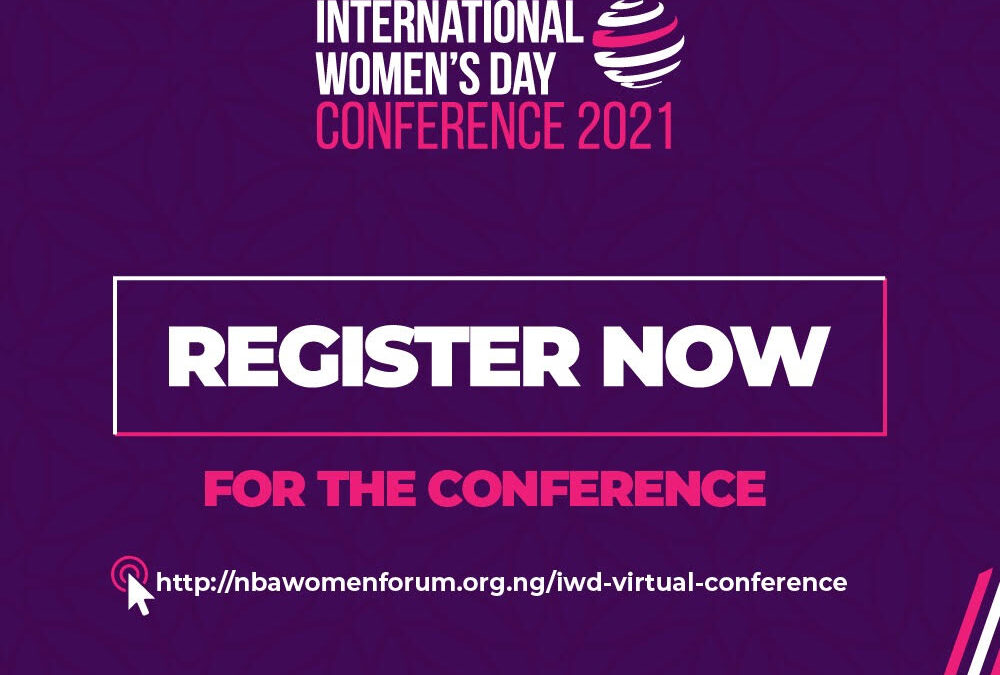
by Legalnaija | Mar 23, 2021 | Uncategorized

The Nigerian Bar Association Women Forum (NBAWF) is pleased to announce its upcoming conference scheduled for Wednesday, 24th March 2021. The conference, the first by the NBAWF will feature an opening ceremony, five themed panel discussions and a training collaboration with the United Nations Global Compact Network.
The conference will begin at 9am with opening remarks by Her Excellency, Anna Ishaku, first lady of Taraba State; Terry Mazur, Chair of the Women in Law Section of the New York State Bar Association; Olumide Akpata, President of the Nigeria Bar Association; Hon. Justice Roli Harriman and Chief Folake Solanke, SAN, first female Senior Advocate of Nigeria (SAN). The keynote address will be delivered by Oby Ezekwesili, Public Analyst and Former Vice President, World Bank’s Africa Region.
The first session captioned “Leadership, Board Participation and Equal Representation in Governance: The Anomaly of Sexism” will feature Taiwo Olusesi, Registrar/CEO ICSAN; Joyce Oduah, General Secretary, NBA; Nneka Onyeali Ikpe, MD, Fidelity Bank; Nkechi Onyenso, Facilitator, Governance and Institution Policy Commission, NESG; Rimini Makama, Director, Microsoft, and will be moderated by Nsidibe Aideyan, Secretary, NBA Women Forum.
The second session on “Gender Diversity and Unity in the Legal Profession: Working Together to Normalise Equality” will highlight the success stories of women silks and the role of female judges in the development of the judiciary, among others. The discussion will be led by Chief Folake Solanke, SAN and moderated by Folashade Alli, Head Advocacy Committee, NBAWF and Principal Partner, Folashade Alli & Associates. Other discussants are Justice Roli Harriman, Aisha Alao, General Counsel, Notore, Funke Agbor, SAN and Rashidat Mohammed.
The third session themed, “The Future is Female: Actions for Accelerating the Growth of Female Lawyers In-House” aims to address the wage disparity between men and women of equal proficiency, how to negotiate for higher pay, and opportunities in the gig-economy for women. This panel moderated by Ayotola Jagun, Chief Compliance/Company Secretary, Oando Plc will feature as discussants Bidemi Ademola, General Counsel, West Africa, Unilever; Seye Kosoko, Company Secretary, FBN Holdings; Ifeoma Utah, General Manager, Legal Services, MTN Nigeria, and Oyinkansola Badejo-Okusanya, Partner, Africa Law Practice.
The fourth session on Gender Bias: Challenging Stereotypes and Reinforcing Diversity and Inclusion focuses on gender equity in academic careers, sexual harassment in the legal profession and the role of female senior lawyer. This discussion will be led by Prof. Yinka Omorogbe and moderated by Dr. Foluke Dada, Council Member, NBAWF. Other discussants are Prof Oluyemisi Bamgbose, SAN, Chairperson NBAWF and Social Justice Administrator, University of Ibadan; Inime Chinwenwo Aguma, Commissioner for Social Welfare & Rehabilitation, Rivers state; Ummahani Amin, Partner, MetLaw and African International Conference on Islamic Finance (AICIF) and Seni Adio, SAN, Managing Partner, Copley Partners and Former Chairman, NBA Section on Business Law.
The fifth session themed, Leading the Charge for Gender Development: Role of the Nigerian Female Lawyer aims to discuss certain paradigm shifts required for the dynamics of equality in the workplace, maternal health, and the path to partnership for the young female lawyer. Discussants in this panel include Stella Duru, Partner, Banwo & Ighodalo; Yejide Osunkeye, Principal, YBO Legal; Dolapo Kukoyi, Partner, Detail Solicitors; Ozofu Ogiemudia, Partner, Udo Udoma & Belo-Osagie and Perenami Momodu, Partner, AELEX. This panel will be moderated by Chinyere Okorocha, Vice Chair, NBAWF and Partner, Jackson, Etti & Edu.
Furthermore, on Thursday, there will be an exclusive special training for young female lawyers, organized by the United Nations Global Compact Network (UNGC) on The Women Empowerment Principles’ Gender Gap Analysis Tool (GAT). The training will be led by Naomi Nwokolo, Executive Director, UNGC, Nigeria; Elizabeth Anna Resch, Adviser, UNGC and Prof. Oluyemisi Bamgbose (SAN).
#NBAWF #ChoosetoChallenge
Click Here to Register: http://nbawomenforum.org.ng/iwd-virtual-conference
Register here – https://zoom.us/webinar/register/WN_E9n50V2ISCuA16aHrMtGAw
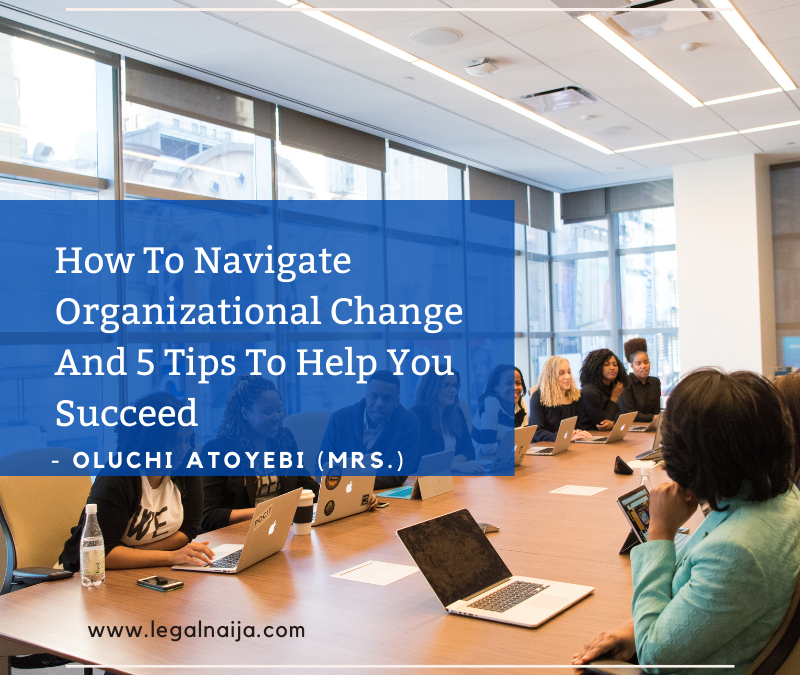
by Legalnaija | Mar 23, 2021 | Uncategorized
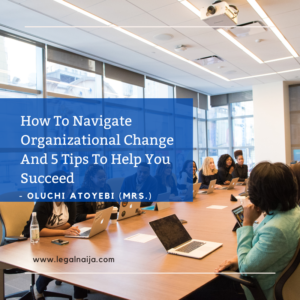
The overarching goal of change management is the successful implementation of new processes, products and business strategies while reducing the negative outcomes. Change management goes beyond project management and technical tasks and leverages on people. The business world is constantly needing to evolve. For instance, between December 2019 and now, businesses have had to review their strategy and adapt to the world of business during the COVID-19 pandemic. Change can be very difficult, and as such usually faces a lot of resistance. It is therefore important to develop a systematic response to change. (more…)
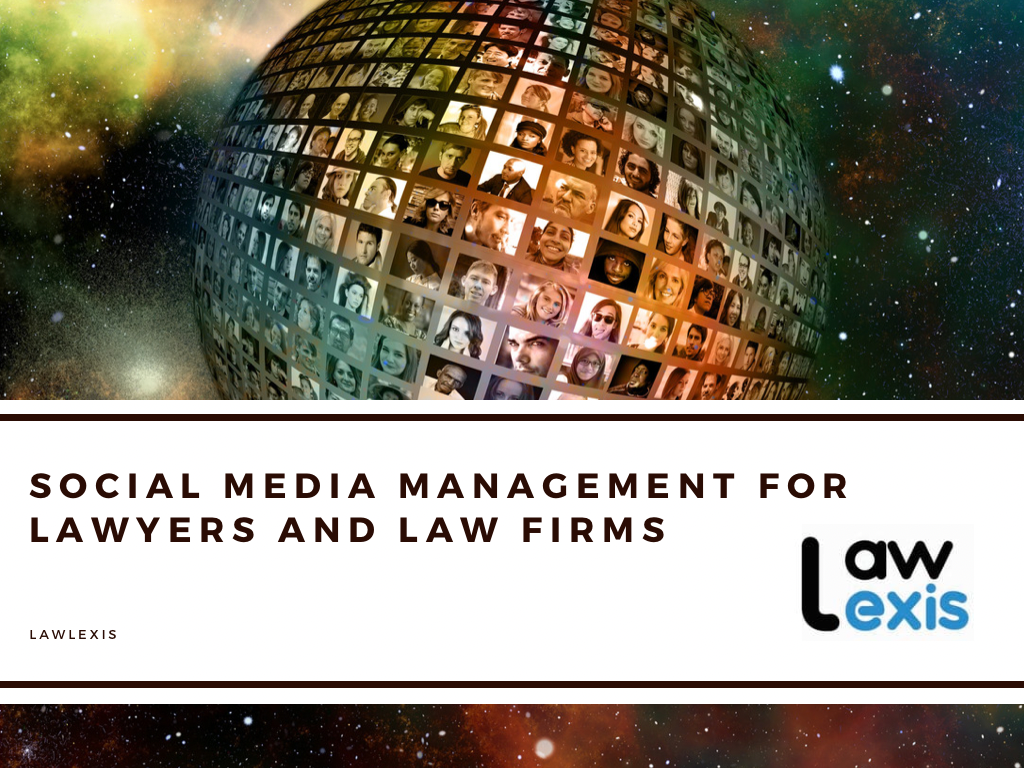
by Legalnaija | Feb 23, 2021 | Uncategorized

With the high rate of internet penetration in the country and the growing use of social media. Every business must aggressively employ the use of social media to reach its targeted audience and market.
As law firms and lawyers directly communicate with the communities they serve, social media becomes a natural way to acquire new clients and establish your practice as a thought leader in your area of expertise.
There are many benefits to using social media for your law firm and at Lawlexis, we would love to help you accomplish all your digital marketing and social media management goals for your law firm or legal practice. Kindly contact us for free consultation via –
– Lawlexisinternational@gmail.com
– 09029755663

by Legalnaija | Feb 18, 2021 | Uncategorized
In establishing any organizational endeavor, an employment contract must be
drawn up. In Nigeria, the employment relationship is governed primarily by the
sources of employment laws in the country. A proper understanding of the laws
that govern an employment relationship and adherence to laws that guide
employees’ rights and employers’obligations, can protect the company from
serious human rights violations.
This article provides a guide to laws governing the employment relationship
in Nigeria, from the sources of the law, the scope of the law, to the tenets of
a typical employment contract.
There are two(2) broad categories of employees in Nigeria, namely:
·
“Workers”, defined under the Labour Act as those “who are
generally employees who perform manual labour or clerical work”; and
·
“Employees”, who perform administrative, executive, technical or
professional functions (referred to as “Non-workers”).
THE SOURCES OF EMPLOYMENT LAW IN
NIGERIA.
The sources of employment law in Nigeria are:
a.
The
Constitution of the Federal Republic of Nigeria 1999 (as amended), referred to
as “the Constitution”.
b.
The
Labour Act Chapter L1, Laws of the Federation of Nigeria 2004 (“Labour Act”),
which prescribes the minimum terms and conditions for employment for workers as defined above. As stipulated
by the Labour act of Nigeria, the details of an employment relationship between
workers and employers should be stipulated in a contract. The Nigerian Labour
Law provides a detailed look into the rights, conditions, minimum wage and many
other tenets set by the Nigerian Government. The current version of the act was
enacted in 2004.
c.
The
Federal laws enacted by the National Assembly (Nigeria’s national legislative
houses) and the State laws enacted by the House of Assembly (the State
legislative authority) of each state, that relate to labour and employment,
pension and workplace compensation, including the following:
●
Guidelines
for the Release of Staff in the Nigeria Oil and Gas Industry, 2019.
●
Employees
Compensation Act 2010
●
Factories
Act FI, LFN 2004
●
Industrial
Training Fund Chapter 19, LFN 2004 (as amended)
●
National
Health Insurance Scheme Act, Chapter N45, LFN 2004
●
National
Oil and Gas Industry Content Development Act 2010
●
Pension
Reform Act 2014
●
Personal
Income Tax Act P8, LFN 2004 as amended by the Trade Union (Amendment) Act 2011
●
Trade
Disputes Act, Chapter T8, LFN 2004
●
Trade
Unions Act, Chapter T14, LFN 2004 as amended by the Trade Union (Amendment) Act
2005
●
Nigeria
Data Protection Regulation 2019 issued by the National Information Technology
Development Agency.
d.
Decisions
of the Nigeria courts – case law, and
e.
International
conventions, treaties and protocols relating to labour, employment, workplace,
industrial relations or matters that connect, which have been ratified by
Nigeria.
SCOPE AND APPLICATION OF THE SOURCES
OF LABOUR LAW
★
The Labour
Act, which is limited in its scope of application as it regulates only the
employment of workers as defined above.
★
The
Constitution, the NICN Act, the Trade Union Act and the Personal Income Tax Act
apply to all categories of employees, with some exceptions.
★
The
Pension Reform Act 2014 applies to all employees in the private sector, other
than judges, members of the armed forces and the intelligent and secret
services.
★
The
Employees Cooperation Act applies to all employees other than members of the armed
forces (although it applies to members of the armed forces employed in a
civilian capacity)
★
The
Industrial Training Fund Act applies to every employer in Nigeria which employs
more than 5 persons, or which employs fewer than 5 persons, but has an annual
turnover of up to 50 million naira.
★
The
National Health Insurance Scheme Act applies to employers which have a minimum
of 10 employees.
★
The
Immigration Act 2015 applies to employers which employ foreign nationals and to
expatriate employees.
TENETS IN AN EMPLOYEE CONTRACT
1.
The
name of the employer and the undertaking where the employee is employed;
2.
The
name and address of the worker;
3.
The
date of engagement;
4.
The
nature of employment;
5.
If the
contract is for a fixed term, expiration date should be stated;
6.
The
period of notice for termination;
7.
The
rates of wages and method of calculation;
8.
The
manner and periodicity of payment of wages;
9.
Terms
and conditions relating to hours of work, holidays and holiday pay, incapacity
for work due to sickness or injury including any provisions for sick pay; and
10. Any special conditions of the contract.
*Special conditions include
Provision of Transport, Annual holidays, Collective Agreements operative in the
Industry or sector and other requirements as the employer may deem fit or as
the employer’s duties may require.
TERMINATING THE EMPLOYMENT CONTRACT
It is required that employers be given notice of termination of their
employment or salary in lieu of such notice.
➔
The
minimum notice period for workers as
defined above in the Labour Act are as follows:
1)
One
day, if the length of the service is up to 3 months.
2)
One
week, if the length of service is up to 2 years.
3)
Two
weeks, if the length of service is up to 5 years.
4)
One
month, if the length of the service is 5 years or more.
➔
It is
agreeable for parties to agree to longer notice periods in their contracts of
employment.
➔
Regarding
employees
as defined above, the applicable notice period is determined by the terms of
their respective contracts of employment.
Written by:
Oluchi Atoyebi (Mrs.)
Mrs. Oluchi Lynda Atoyebi, is the Principal Partner
and CEO of Eclat Human Resources Consulting Limited. She is a seasoned human
resource executive with several years of progressive experience in developing
and executing comprehensive management strategies and structures across
industries. She has achieved great results through using a people-first system.
Mrs Oluchi Lynda Atoyebi has her certifications in Human Resource Management under
the institutes of Chartered Institute of Management (CIPM) an MBA in Human
Resource Management from the prestigious Nile University of Nigeria with her
first degree in Political Science from the esteemed Amadu Bello University
(ABU), she has held several executive and consulting positions and she is
currently the Human Resource Director of Omaplex Law Firm, the fastest growing
and pacesetting law firm in Nigeria.
With several professional certifications in HR and
Etiquette, Mrs. Oluchi Atoyebi is driven by the passion to impact the
lives of people positively by helping to build the capacity to become
employable locally and internationally.
This passion led to the establishment of Eclat Human
Resources Consulting Limited which is focused
on enabling individuals and corporate bodies achieve their desired outcome
through the provision of workable systems, structures, and people.
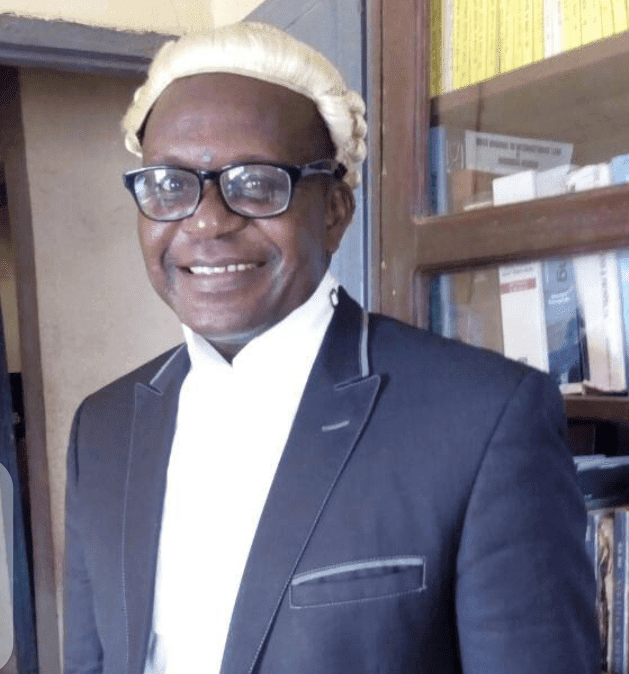
by Legalnaija | Feb 16, 2021 | Uncategorized
A Gospel song writer says and I quote “What do we do when we don’t know what to do? Where do we run to when we don’t know where to go? And what do we say when we don’t know what to say?” I must confess that I don’t know what to say about the death of Chief Hon. Olubunmi Olugbade. I have been inundated with calls from friends and colleagues wondering whether the news of his death is true and how. Even though I do not know what to say, it has become inevitable for me to say something in his honour.
Let me start by saying that nobody no matter how powerful can add one second to his life. Secondly, I also recognise as a believer that there is no accident in predestination. Hence, the scripture says “that there is a time to be born and there is a time to die.” The timing of these two great events of life is beyond the knowledge and comprehension of any man. With this understanding, no one can query God. “Kabio osi!”

Hon. Olubunmi Olugbade died exactly a week ago from today, February 9th, 2021 after a protracted illness. He was aged 61. Hon. Olugbade’s death is much more painful to me because I know that he carried the sole responsibility of looking after his six (6) children, his wife having died earlier in June 2018. Three (3) of these children are under 20. He was on sick bed for several months. I cannot help but to say that death is cruel and that devil, the author of death is wicked but I have a word for the children. That when the devil is at its worst, God is always at His best.
Hon. Olubunmi Olugbade was a good man. A very sincere and loyal friend, highly passionate and committed to relationship. A very brilliant Legal Practitioner and an outstanding Politician in Ekiti State. He was a former Honourable Member of the House of Assembly of Ekiti State where he made a mark. He was a former Chairman of Nigerian Bar Association, Ikere Branch, Ekiti State and a former member of the National Executive Committee of the Nigerian Bar Association. He was a great player and indeed an influencer in the affairs of Egbe Amofin – the South-west caucus of Nigerian Lawyers. A transparent and honest man, highly reliable, unreservably selfless and absolutely committed to any cause that he believed in. I also know as a fact that he was a traditional title holder of Apelua of Ilawe, Ekiti and a great confidant of our traditional ruler back home.
The great legend Chief Obafemi Awolowo once said “All that I want in life is to live for history. To live for history is not to die but to be in the hearts of all men and to be in the hearts of men is to serve them selflessly.” You served your community to the utmost best of your ability and capacity as Chief Apelua of Ilawe Ekiti. You served your State very diligently as a honourable member of the House of Assembly and you served your profession creditably to the level that circumstances and situations permitted the opportunity. Above all, you served God dedicatedly through the platform of the Redeemed Christian Church of God. You therefore shall be in the hearts of so many people, too numerous to count and from different levels of humanity. Therefore, Chief Hon. Olubunmi Olugbade, you are not dead. You have barely transited from mortality to immortality. You are alive in our hearts.
I pray that God Almighty, the father of the fatherless shall rise up mightily for the children and other relatives that you left behind. He shall raise men and women for them and for their needs. When they need you, they shall see God.
Rest in perfect peace!
Dated 16th February, 2021.
DELE ADESINA SAN
PAST GENERAL SECRETARY,
NIGERIAN BAR ASSOCIATION.


















